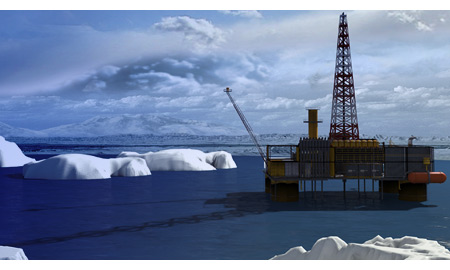
OSLO, Jan 17th 2014
-
(Reuters) Delays to flagship Arctic projects due to sharply higher costs and taxes, and lower oil prices, will hamper Norway's efforts to revive oil output stuck at a 25-year low, officials and companies say.
The development of several smaller fields, which often fly under the radar, is also either delayed or in doubt, the Norwegian Petroleum Directorate (NPD) told Reuters.
Cost in Norway's oil sector have roughly doubled between 2005 and 2012 and a tax hike unveiled last year pushed several projects over the edge just as oil firms around the globe increased efforts to reduce spending to save cash for dividends.
Norway expects oil investments to grow just 2 percent this year and next, a big drop from a decade of double-digit growth rates. It also cut its oil output forecast for the year.
"The problem is that we (as an industry) are too expensive and make too little profit," Mads Andersen, the Norwegian country chief of oil services firm Cameron said.
Statoil delayed some of its biggest projects, like the $15.5 billion Johan Castberg in the Barents Sea and its biggest find in decades, the Johan Sverdrup field with up to 2.9 billion barrels of oil.
The NPD said that Shell's Linnorm field in the Norwegian Sea, expected to pump about 100,000 barrels of oil equivalents per day, was delayed - with no new date for its development. There was also a risk Statoil would delay plans for its 50-million-barrel Trestakk project this year.
Wintershall, a unit of BASF, has also delayed its Maria development and it was uncertain if RWE would submit its plan for its Zidane project in the Norwegian Sea, despite the company's June target, the NPD told Reuters. Both firms, however, said they were aiming to submit plans in 2014.
"Pretty much all of the projects in the Barents Sea are in danger and I'm reasonably sure that all of the gas projects in the Barents Sea will be put on hold for many years," analyst John Olaisen at equities brokerage ABG Sundal Collier said.
"The reason for this is a combination of gas prices, costs and lack of infrastructure in the Barents Sea," he said. "I don't think these projects are gone forever, they will just be put on hold for some years."
Just this week Norway increased its undiscovered resource estimate for the Barents sea by 33 percent to 8 billion of barrels of oil equivalents.
But work in the Barents Sea and the Norwegian Sea will take longer to take off because firms are struggling to make a profit and need to build expensive infrastructure, more readily available in the more developed North Sea.
OIL PRICE AND EARNINGS
Brent crude spot prices averaged between $108 barrel and $112 per barrel over the second half of 2013 but the International Energy Agency expects it to weaken to $105 this year and $102 in 2015 as Libya, Iraq and Iran increase supplies.
"I think most people who make oil price forecasts see lower oil prices going forward than they thought a year ago," said Ivar Aasheim, Statoil's head of field development in Norway. "This leads to a bit more careful approach."
"Now it's all about reducing costs, increasing reserves and working with the government," he said.
The expected decline in prices is not big, but given the rapid cost increase, it would quickly squeeze margins, a problem as many of top oil firms, like Shell, Statoil and ENI have negative cash flows after dividend payments.
Analysts expect European oil firms to report a 20-percent year-on-year drop in fourth-quarter earnings, Thomson Reuters data shows.
"We are now seeing delays even on some of the most profitable projects," said oil sector analyst Trond Omdal at Arctic Securities in Oslo. "Oil companies are now taking a second look at most of their planned projects."
Unions said that Norway's oil sector was paying the price for growing too fast.
"You have had an investment rate of over 200 billion crowns a year and it is not sustainable," Leif Sande, the head of Industri Energi said.
"We don't have enough qualified workers for that level of activity. There are lots of new rigs coming in now and they have no idea how to find enough people to put on them."
Sumber : www.Rigzone.com





